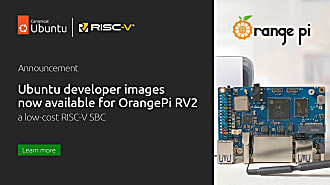Canonical
on 27 September 2022
Canonical Announces Ubuntu 22.04 LTS Support for FlexRAN Reference Software
Real-time kernel support delivers performance for 5G network architectures
Canonical is thrilled to announce today the availability of Ubuntu 22.04 LTS with real-time kernel support and optimizations for Intel’s latest FlexRAN Reference Software. Designed to meet telecom network transformation needs for 5G, Ubuntu 22.04 LTS real-time kernel delivers performance, guaranteed ultra-low latency and security for critical infrastructure. With this release, Canonical strengthens its commitment to help telecommunications service providers benefit from the technological and economic benefits of open source-software in a secure and supported manner.
Building the 5G networks of the future
Telecom operators need to rapidly evolve their network architectures to process high-bandwidth, real-time data. Intel’s FlexRAN software is at the heart of the access network transformation and is used to deploy 4G and 5G cloud-native virtualised radio access networks (vRANs) .
RAN virtualisation provides operators with increased scalability and flexibility for their radio access networks. With Ubuntu, companies serving the OpenRAN ecosystem can get the latest kernel versions (5.x) to achieve more speed compared to other supported Linux distributions. OpenRAN solutions require low latency and high throughput and are built based on custom Layer 1 or Layer 2 (L1/L2) implementations or using specialised SDKs.
“Ubuntu 22.04 LTS, with Real-Time Kernel, was engineered from the ground up to enable unrivalled performance and efficiency gains for Communications Service Providers. I’d like to thank our OpenRAN ecosystem partners, especially Intel, for their continued support to drive Cloud and Edge infrastructure innovation on our most recent journey to enabling Intel FlexRAN Reference Software on Ubuntu,” said Arno Van Huyssteen, CTO – Communication Service Provider, Canonical.
“The optimisations we made to increase OpenRAN performance are a major milestone for our team. Running FlexRAN on Ubuntu allows mobile operators to use familiar upstream Kubernetes, automation frameworks, and open-source tools, and see performance gains from the latest real-time kernel package tuned for telco. Now they can get a full stack from bare metal to RU, CU, DU and RIC which is tested, validated and supported”, says Maciej Mazur, Product Strategy Manager for Telco at Canonical.
A full stack for telco
Besides offering real-time-kernel capabilities in Ubuntu which are suited for today’s 5G networks, Canonical offers a full stack of supported open-source technology building blocks, providing a unified approach for telco transformation.
Canonical conducted detailed performance testing, with OpenRAN on bare metal as well as on Canonical’s MicroK8s and Charmed Kubernetes distributions. The tests showed that Ubuntu delivers better results than any other operating system thanks to the company’s tight collaboration with upstream kernel development and extremely fast patching and release cycles. Telecom providers can deploy containers without compromising on performance or security.
Canonical also offers support for various accelerators, such as FPGA, SmartNICs, GPUs. Telecom operators can manage thousands of sites in a fully automated fashion with server provisioning tools like Canonical MAAS (Metal as a Service). MAAS supports API-driven re-building for sites with various configurations. The solution provides tenant separation for MORAN and MOCN use cases.
Additional resources
- Visit Intel’s documentation portal for more information about Intel FlexRAN on Ubuntu, release notes, and installation guides.
- Contact Canonical for more technical details and benchmarks.



